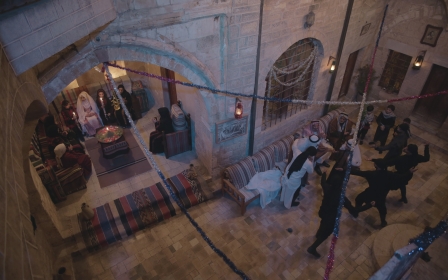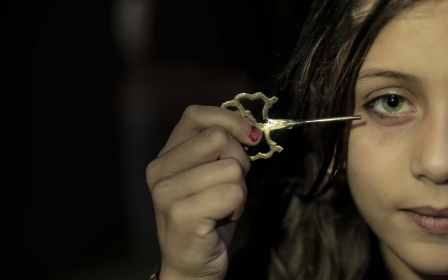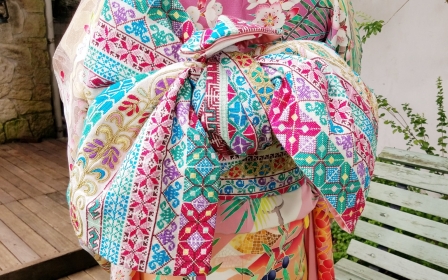In pictures: 'Bringing happiness to our hearts' - the joy of a Palestinian wedding
Hala Shoman and Ihab Saleh enter the wedding hall of a hotel in Gaza to celebrate their long-awaited wedding ceremony. The couple first met in 2019, but waited until they had both completed their studies to get married in a traditional Palestinian ceremony. A wedding like theirs offers a window into Palestinian culture and illustrates how basic social customs function under the Israeli-imposed siege of Gaza, as well as the Covid-19 pandemic. (All images by Hosam Salem)
When they met, the couple were studying in the UK on Chevening Scholarships, funded by the British government's Foreign Office. After they completed their masters degrees, they returned to Gaza in March of this year. In this picture, Saleh's mother places some henna in his hand as part of the wedding rituals.
Holding henna, Shoman, 28, and Saleh, 27, continue a tradition that is a part of many Palestinian and regional weddings. The practice is said to symbolise blessings, joy and luck.
Henna is made by drying and crushing the leaves of the Lawsonia plant, and then mixing them with water to create a paste. The paste is seen in the picture above in a tray decorated by the groom's mother. In Palestine the colourful natural dye is said to represent people's connection with the earth.
Saleh, who completed his MA in Global Health at the University of Glasgow, and Shoman, who studied Social Anthropology at Durham University, told Middle East Eye that it was important to both of them that their wedding be held in Palestine. “During our time abroad, we yearned for the homeland and our culture and traditions," says Shoman. "It’s also about preserving our Palestinian identity.”
The couple say they kept their wedding small, with just 80 guests, because of the rise in Covid-19 cases in the Gaza Strip, but family and friends were still able to enjoy the occasion. A guest is seen here dancing with the decorated henna tray. "If there had been no Corona, we would have invited all our loved ones and friends," says Shoman.
The bride later offers a tray of sweets to the guests at her wedding. They are also served musakhan - a dish of chicken baked with olive oil and sumac, wrapped in traditional taboun flatbread. For dessert, they had knafeh, a local sweet made with either vermicelli or semolina, stuffed with white cheese and sweetened with sugary syrup.
The dabke, a traditional folk dance accompanied by a band, is performed by a professional group to entertain the guests. The dabke - which involves coordinated moves similar to a line or circle dance - is common to the Levant, with each country maintaining its own specific style.
Family and friends join in the dance and sing celebratory songs welcoming guests to the wedding. A fadous band uses traditional instruments like the tabla, daf and shababah to play folk songs about love, unity and Palestine, including hits such as Arab idol's winner Mohammed Assaf's Ali al-Kuffiyeh.
Most of the guests at Shoman and Saleh's wedding wore traditional Palestinian clothing with intricate tatreez stitching, representing different Palestinian cities through the designs and colours of the embroidery. Over the years, the fashion has become a unifying symbol for Palestinians, especially those in the diaspora.
Tatreez also featured in the couple's own clothing. Saleh wore a tie with tatreez, and Shoman's wedding dress was embroidered with the colourful design. She also wore a gold coin headpiece worn by Palestinian brides.
The bride's father, Abdel Fattah Shoman, told Middle East Eye: "The wedding was one of the most beautiful events I attended in my life... it brought happiness to our hearts and brought back memories."
In this picture, Saleh and Shoman pour Palestinian ahweh, a traditional dark roast coffee boiled with cardamom, for their guests. The couple are both from refugee families. Saleh's family are from Burayr, while Shoman's hail from Iraq Suwaydan. Both villages, which are north east of Gaza, were ethnically cleansed in 1948 and incorporated into Israel.
The couple both returned to their jobs in Gaza, Shoman as a dentist and Saleh as the director of medical programmes at Medecins du Monde, an international organisation that supports the health sector in Palestine. They say they hope to remain in Gaza to help improve the situation there, especially after the recent Israeli bombing campaign.
Middle East Eye delivers independent and unrivalled coverage and analysis of the Middle East, North Africa and beyond. To learn more about republishing this content and the associated fees, please fill out this form. More about MEE can be found here.




